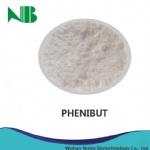NSI-189
Product Description:
Product Name: NSI-189
Synonyms: NSI-189;[2-[(3-Methylbutyl)amino]-3-pyridinyl][4-(phenylmethyl)-1-piperazinyl]methanone;[2-[(3-Methylbutyl)amino]-3-pyridinyl][4-(phenylmethyl)-1-piperazinyl]methanone NSI189;NSI-189 [2-[(3-Methylbutyl)amino]-3-pyridinyl][4-(phenylmethyl)-1-piperazinyl]methanone;NSI-189, >=98%;(4-benzylpiperazin-1-yl)-[2-(3-methylbutylamino)pyridin-3-yl]
CAS: 1270138-40-3
MF: C22H30N4O
MW: 366.4998
What is NSI-189 ?
NSI-189 is neurogenic and nootropic research agent that was developed from nicotinamide and pyrazine. Randomized controlled trials have shown that it stimulates neurogenesis or neuronal cell production in the brain. In animal studies, it has also been shown to increase the volume of hippocampus by 20% thereby reversing behavioral symptoms of depression. Such studies have shown that it may be an effective treatment for depression. It is also thought to be a promising treatment for other condition including post-traumatic stress disorder (PTSD), Alzheimer’s disease and age-related cognitive problems.
NSI-189 has been proved that is thought to potentially promote increased neuronal production whilst treat depression is NSI-189. This article discusses NSI-189 and how this novel nootropic agent can revolutionize the treatment for depression, and possibly other neurodegenerative disorders.
Current treatments for major depressive disorder (MDD) mostly include the use of oral medications to modulate critical neurotransmitters in the brain. Selective serotonin reuptake inhibitors (SSRIs) are believed to be the most commonly and widely prescribed treatment for depression. Most recent research however reveals that there is a new theory regarding the cause of major depressive disorder. This theory implicates that brain physiology also influences depression rather than brain chemistry problems alone. Researchers have discovered that the disease leads to decreased hippocampal volume. Note that a healthy hippocampus is an excellent source of neural stem cells which lead to the production of neurons. Neurons on the other hand are critical for creating essential new connections in the brain. Through the production of new neurons in the hippocampal area, depression can be treated.
NSI-189’s Method of Action
Although it has been demonstrated in rats and chimps, the suggestion that having too small of a hippocampus causes depression and other diseases in humans is still technically just a theory. NSI-189 increases hippocampal volume in adult mice by 20%, a region of the brain that is one of the first to suffer damage resulting in memory loss, disorientation, encephalitis, and hypoxia from disease’s such as Alzheimer’s .
How NSI-189 works ?
This drug was developed to address three important aspects of depression including hippocampal volume, neurogenesis and neurotransmission. NSI-189 increases the volume within the hippocampus. In so doing, hippocampal volume and healthy brain cell density is increased thereby improving mod and cognitive performance. Aside from increasing hippocampal volume, the drug also improves neuronal cell functionality. It works it promoting healthy neuronal cell growth whilst repair damaged areas in the brain.
NSI-189 Benefits
Tests have shown that NSI-189 significantly improved behavioral responses that are associated with depression (6). In humans it may counter hippocampal atrophy which is seen in disorders such as MDD, reversing their symptoms. A phase 1B randomized, double-blind, placebo-controlled, multiple-dose escalation study conducted over a 28 day period showed behavioral efficacy in 24 patients who were orally administered NSI-189 . The efficacy measurements showed a clinically meaningful reduction in cognitive and depressive symptoms across all measures, and appeared to persist over time during follow up for the efficacy assessments which included the Clinical Global Impression – Improvement (CGI-I), Montgomery-Aserb Depression Rating Scale (MADRS), Cognitive and Physical Functioning Questionnaire (CPFQ, and the Symptoms of Depression Questionnaire (SDQ)
Dosing NSI-189
Phase 1A tested escalating doses of the neurogenic compound NSI-189 in healthy patients, 1B tested the safety of escalating doses in 24 depressed patients over the course of 28 days . During phase 1B patients were administered 40 mg per day, and 80 mg per day, and at the highest dose 120 mg per day. No serious adverse events occurred during the time of the study and the drug was well tolerated. Reduction in cognitive and depressive symptoms were observed across all measures for the two lower doses 40 mg/day and 80 mg/day but not for the highest dose 120 mg/day
Synonyms: NSI-189;[2-[(3-Methylbutyl)amino]-3-pyridinyl][4-(phenylmethyl)-1-piperazinyl]methanone;[2-[(3-Methylbutyl)amino]-3-pyridinyl][4-(phenylmethyl)-1-piperazinyl]methanone NSI189;NSI-189 [2-[(3-Methylbutyl)amino]-3-pyridinyl][4-(phenylmethyl)-1-piperazinyl]methanone;NSI-189, >=98%;(4-benzylpiperazin-1-yl)-[2-(3-methylbutylamino)pyridin-3-yl]
CAS: 1270138-40-3
MF: C22H30N4O
MW: 366.4998
What is NSI-189 ?
NSI-189 is neurogenic and nootropic research agent that was developed from nicotinamide and pyrazine. Randomized controlled trials have shown that it stimulates neurogenesis or neuronal cell production in the brain. In animal studies, it has also been shown to increase the volume of hippocampus by 20% thereby reversing behavioral symptoms of depression. Such studies have shown that it may be an effective treatment for depression. It is also thought to be a promising treatment for other condition including post-traumatic stress disorder (PTSD), Alzheimer’s disease and age-related cognitive problems.
NSI-189 has been proved that is thought to potentially promote increased neuronal production whilst treat depression is NSI-189. This article discusses NSI-189 and how this novel nootropic agent can revolutionize the treatment for depression, and possibly other neurodegenerative disorders.
Current treatments for major depressive disorder (MDD) mostly include the use of oral medications to modulate critical neurotransmitters in the brain. Selective serotonin reuptake inhibitors (SSRIs) are believed to be the most commonly and widely prescribed treatment for depression. Most recent research however reveals that there is a new theory regarding the cause of major depressive disorder. This theory implicates that brain physiology also influences depression rather than brain chemistry problems alone. Researchers have discovered that the disease leads to decreased hippocampal volume. Note that a healthy hippocampus is an excellent source of neural stem cells which lead to the production of neurons. Neurons on the other hand are critical for creating essential new connections in the brain. Through the production of new neurons in the hippocampal area, depression can be treated.
NSI-189’s Method of Action
Although it has been demonstrated in rats and chimps, the suggestion that having too small of a hippocampus causes depression and other diseases in humans is still technically just a theory. NSI-189 increases hippocampal volume in adult mice by 20%, a region of the brain that is one of the first to suffer damage resulting in memory loss, disorientation, encephalitis, and hypoxia from disease’s such as Alzheimer’s .
How NSI-189 works ?
This drug was developed to address three important aspects of depression including hippocampal volume, neurogenesis and neurotransmission. NSI-189 increases the volume within the hippocampus. In so doing, hippocampal volume and healthy brain cell density is increased thereby improving mod and cognitive performance. Aside from increasing hippocampal volume, the drug also improves neuronal cell functionality. It works it promoting healthy neuronal cell growth whilst repair damaged areas in the brain.
NSI-189 Benefits
Tests have shown that NSI-189 significantly improved behavioral responses that are associated with depression (6). In humans it may counter hippocampal atrophy which is seen in disorders such as MDD, reversing their symptoms. A phase 1B randomized, double-blind, placebo-controlled, multiple-dose escalation study conducted over a 28 day period showed behavioral efficacy in 24 patients who were orally administered NSI-189 . The efficacy measurements showed a clinically meaningful reduction in cognitive and depressive symptoms across all measures, and appeared to persist over time during follow up for the efficacy assessments which included the Clinical Global Impression – Improvement (CGI-I), Montgomery-Aserb Depression Rating Scale (MADRS), Cognitive and Physical Functioning Questionnaire (CPFQ, and the Symptoms of Depression Questionnaire (SDQ)
Dosing NSI-189
Phase 1A tested escalating doses of the neurogenic compound NSI-189 in healthy patients, 1B tested the safety of escalating doses in 24 depressed patients over the course of 28 days . During phase 1B patients were administered 40 mg per day, and 80 mg per day, and at the highest dose 120 mg per day. No serious adverse events occurred during the time of the study and the drug was well tolerated. Reduction in cognitive and depressive symptoms were observed across all measures for the two lower doses 40 mg/day and 80 mg/day but not for the highest dose 120 mg/day
Links:
Copyright © Wuhan Nutra Biotechnology Co., Ltd. All right reserved















